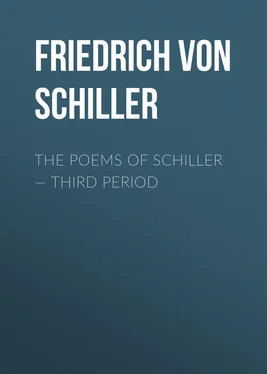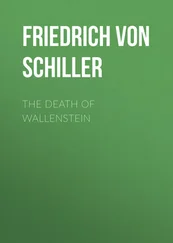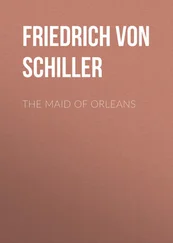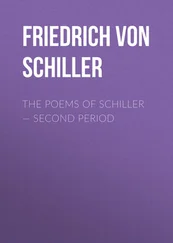Friedrich Schiller - The Poems of Schiller — Third period
Здесь есть возможность читать онлайн «Friedrich Schiller - The Poems of Schiller — Third period» — ознакомительный отрывок электронной книги совершенно бесплатно, а после прочтения отрывка купить полную версию. В некоторых случаях можно слушать аудио, скачать через торрент в формате fb2 и присутствует краткое содержание. Жанр: literature_18, Поэзия, foreign_antique, foreign_prose, foreign_poetry, на английском языке. Описание произведения, (предисловие) а так же отзывы посетителей доступны на портале библиотеки ЛибКат.
- Название:The Poems of Schiller — Third period
- Автор:
- Жанр:
- Год:неизвестен
- ISBN:нет данных
- Рейтинг книги:3 / 5. Голосов: 1
-
Избранное:Добавить в избранное
- Отзывы:
-
Ваша оценка:
- 60
- 1
- 2
- 3
- 4
- 5
The Poems of Schiller — Third period: краткое содержание, описание и аннотация
Предлагаем к чтению аннотацию, описание, краткое содержание или предисловие (зависит от того, что написал сам автор книги «The Poems of Schiller — Third period»). Если вы не нашли необходимую информацию о книге — напишите в комментариях, мы постараемся отыскать её.
The Poems of Schiller — Third period — читать онлайн ознакомительный отрывок
Ниже представлен текст книги, разбитый по страницам. Система сохранения места последней прочитанной страницы, позволяет с удобством читать онлайн бесплатно книгу «The Poems of Schiller — Third period», без необходимости каждый раз заново искать на чём Вы остановились. Поставьте закладку, и сможете в любой момент перейти на страницу, на которой закончили чтение.
Интервал:
Закладка:
THE FOUR AGES OF THE WORLD
The goblet is sparkling with purpled-tinged wine,
Bright glistens the eye of each guest,
When into the hall comes the Minstrel divine,
To the good he now brings what is best;
For when from Elysium is absent the lyre,
No joy can the banquet of nectar inspire.
He is blessed by the gods, with an intellect clear,
That mirrors the world as it glides;
He has seen all that ever has taken place here,
And all that the future still hides.
He sat in the god's secret councils of old
And heard the command for each thing to unfold.
He opens in splendor, with gladness and mirth,
That life which was hid from our eyes;
Adorns as a temple the dwelling of earth,
That the Muse has bestowed as his prize,
No roof is so humble, no hut is so low,
But he with divinities bids it o'erflow.
And as the inventive descendant of Zeus,
On the unadorned round of the shield,
With knowledge divine could, reflected, produce
Earth, sea, and the star's shining field, —
So he, on the moments, as onward they roll,
The image can stamp of the infinite whole.
From the earliest age of the world he has come,
When nations rejoiced in their prime;
A wanderer glad, he has still found a home
With every race through all time.
Four ages of man in his lifetime have died,
And the place they once held by the fifth is supplied.
Saturnus first governed, with fatherly smile,
Each day then resembled the last;
Then flourished the shepherds, a race without guile
Their bliss by no care was o'ercast,
They loved, — and no other employment they had,
And earth gave her treasures with willingness glad.
Then labor came next, and the conflict began
With monsters and beasts famed in song;
And heroes upstarted, as rulers of man,
And the weak sought the aid of the strong.
And strife o'er the field of Scamander now reigned,
But beauty the god of the world still remained.
At length from the conflict bright victory sprang,
And gentleness blossomed from might;
In heavenly chorus the Muses then sang,
And figures divine saw the light; —
The age that acknowledged sweet phantasy's sway
Can never return, it has fleeted away.
The gods from their seats in the heavens were hurled,
And their pillars of glory o'erthrown;
And the Son of the Virgin appeared in the world
For the sins of mankind to atone.
The fugitive lusts of the sense were suppressed,
And man now first grappled with thought in his breast.
Each vain and voluptuous charm vanished now,
Wherein the young world took delight;
The monk and the nun made of penance a vow,
And the tourney was sought by the knight.
Though the aspect of life was now dreary and wild,
Yet love remained ever both lovely and mild.
An altar of holiness, free from all stain,
The Muses in silence upreared;
And all that was noble and worthy, again
In woman's chaste bosom appeared;
The bright flame of song was soon kindled anew
By the minstrel's soft lays, and his love pure and true.
And so, in a gentle and ne'er-changing band,
Let woman and minstrel unite;
They weave and they fashion, with hand joined to hand,
The girdle of beauty and right.
When love blends with music, in unison sweet,
The lustre of life's youthful days ne'er can fleet.
THE MAIDEN'S LAMENT
The clouds fast gather,
The forest-oaks roar —
A maiden is sitting
Beside the green shore, —
The billows are breaking with might, with might,
And she sighs aloud in the darkling night,
Her eyelid heavy with weeping.
"My heart's dead within me,
The world is a void;
To the wish it gives nothing,
Each hope is destroyed.
I have tasted the fulness of bliss below
I have lived, I have loved, — Thy child, oh take now,
Thou Holy One, into Thy keeping!"
"In vain is thy sorrow,
In vain thy tears fall,
For the dead from their slumbers
They ne'er can recall;
Yet if aught can pour comfort and balm in thy heart,
Now that love its sweet pleasures no more can impart,
Speak thy wish, and thou granted shalt find it!"
"Though in vain is my sorrow,
Though in vain my tears fall, —
Though the dead from their slumbers
They ne'er can recall,
Yet no balm is so sweet to the desolate heart,
When love its soft pleasures no more can impart,
As the torments that love leaves behind it!"
TO MY FRIENDS
Yes, my friends! — that happier times have been
Than the present, none can contravene;
That a race once lived of nobler worth;
And if ancient chronicles were dumb,
Countless stones in witness forth would come
From the deepest entrails of the earth.
But this highly-favored race has gone,
Gone forever to the realms of night.
We, we live! The moments are our own,
And the living judge the right.
Brighter zones, my friends, no doubt excel
This, the land wherein we're doomed to dwell,
As the hardy travellers proclaim;
But if Nature has denied us much,
Art is yet responsive to our touch,
And our hearts can kindle at her flame.
If the laurel will not flourish here —
If the myrtle is cold winter's prey,
Yet the vine, to crown us, year by year,
Still puts forth its foliage gay.
Of a busier life 'tis well to speak,
Where four worlds their wealth to barter seek,
On the world's great market, Thames' broad stream;
Ships in thousands go there and depart —
There are seen the costliest works of art,
And the earth-god, Mammon, reigns supreme
But the sun his image only graves
On the silent streamlet's level plain,
Not upon the torrent's muddy waves,
Swollen by the heavy rain.
Far more blessed than we, in northern states
Dwells the beggar at the angel-gates,
For he sees the peerless city — Rome!
Beauty's glorious charms around him lie,
And, a second heaven, up toward the sky
Mounts St. Peter's proud and wondrous dome.
But, with all the charms that splendor grants,
Rome is but the tomb of ages past;
Life but smiles upon the blooming plants
That the seasons round her cast.
Greater actions elsewhere may be rife
Than with us, in our contracted life —
But beneath the sun there's naught that's new;
Yet we see the great of every age
Pass before us on the world's wide stage
Thoughtfully and calmly in review
All. in life repeats itself forever,
Young for ay is phantasy alone;
What has happened nowhere, — happened never, —
That has never older grown!
PUNCH SONG
Four elements, joined in
Harmonious strife,
Shadow the world forth,
And typify life.
Into the goblet
The lemon's juice pour;
Acid is ever
Life's innermost core.
Now, with the sugar's
All-softening juice,
The strength of the acid
So burning reduce.
The bright sparkling water
Now pour in the bowl;
Water all-gently
Encircles the whole.
Let drops of the spirit
To join them now flow;
Life to the living
Naught else can bestow.
Интервал:
Закладка:
Похожие книги на «The Poems of Schiller — Third period»
Представляем Вашему вниманию похожие книги на «The Poems of Schiller — Third period» списком для выбора. Мы отобрали схожую по названию и смыслу литературу в надежде предоставить читателям больше вариантов отыскать новые, интересные, ещё непрочитанные произведения.
Обсуждение, отзывы о книге «The Poems of Schiller — Third period» и просто собственные мнения читателей. Оставьте ваши комментарии, напишите, что Вы думаете о произведении, его смысле или главных героях. Укажите что конкретно понравилось, а что нет, и почему Вы так считаете.











